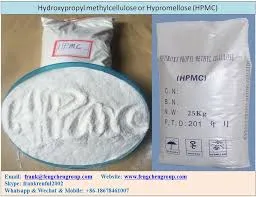
nóv . 24, 2024 14:16 Back to list
Exploring the Properties and Applications of Hydroxyethyl Cellulose in Various Industries
Hydroxyethyl Cellulose Applications and Benefits
Hydroxyethyl cellulose (HEC) is a water-soluble derivative of cellulose, a natural polymer that occurs abundantly in the cell walls of plants. This versatile material has garnered significant attention in various industries due to its unique properties, which include excellent thickening, gelling, and film-forming capabilities. In this article, we will explore the characteristics, applications, and benefits of hydroxyethyl cellulose, shedding light on its importance in today’s material science landscape.
Properties of Hydroxyethyl Cellulose
HEC is derived from cellulose through a process called etherification, where ethylene oxide is reacted with cellulose to introduce hydroxyethyl groups. This modification enhances the solubility of cellulose in water and polarly organic solvents, making it suitable for numerous applications. HEC is known for its non-ionic nature, which means it does not carry a charge. This characteristic allows it to be used in a wide range of pH levels without affecting its performance.
The thickening power of hydroxyethyl cellulose is particularly noteworthy. It can provide low to medium viscosity solutions, making it an ideal thickener for various products. Additionally, HEC has excellent film-forming properties, allowing it to create flexible and transparent films when dried. Furthermore, HEC is biodegradable and non-toxic, making it an environmentally friendly choice in various formulations.
Applications of Hydroxyethyl Cellulose
1. Cosmetics and Personal Care Products One of the most prevalent applications of hydroxyethyl cellulose is in the cosmetics industry. HEC is widely used in skin care products, shampoos, and lotions due to its ability to act as a thickener and stabilizer. It helps improve the texture and feel of formulations, ensuring even distribution across the skin. Moreover, its film-forming ability provides a smooth, velvety finish to products.
2. Pharmaceuticals Hydroxyethyl cellulose is also utilized in the pharmaceutical sector, particularly in drug formulations. It is used as a binder in tablets and as a viscosity-enhancing agent in liquid medicines. HEC's safety profile and inert nature make it an ideal choice for products that require prolonged contact with mucous membranes.
hydroxyethyl cellulose

3. Construction and Building Materials In the construction industry, HEC acts as a water-retaining agent in formulations like mortars, plasters, and tiles adhesives. By enhancing workability and reducing water loss, hydroxyethyl cellulose contributes to improved performance and durability of construction materials.
4. Food Industry Hydroxyethyl cellulose is employed as a food additive, serving as a thickening and stabilizing agent in various food products. It helps improve texture and consistency, which is essential in items such as sauces, dressings, and ice creams.
5. Agriculture In agronomy, HEC is utilized in herbicides and pesticide formulations as a dispersing agent. Its ability to maintain uniformity and stability in mixtures enhances the effectiveness of agricultural chemicals.
Benefits of Hydroxyethyl Cellulose
The primary benefits of hydroxyethyl cellulose stem from its versatility and performance. Its non-toxic and biodegradable nature aligns with the increasing demand for sustainable products, especially in cosmetics and food formulations. Furthermore, HEC enhances the functionality of products, improving texture, consistency, and stability.
In addition, hydroxyethyl cellulose's processing advantages cannot be overlooked. It can be easily incorporated into various formulations, and its properties can be modified through varying degrees of substitution, allowing for tailored applications depending on specific requirements.
Conclusion
In conclusion, hydroxyethyl cellulose is a vital ingredient across multiple industries, thanks to its unique properties and benefits. Its broad application range—from cosmetics and pharmaceuticals to food and construction—is a testament to its versatility and effectiveness. As industries continue to prioritize sustainability and product performance, the significance of hydroxyethyl cellulose is likely to grow, making it an invaluable component of modern formulations.
-
Versatile Hpmc Uses in Different Industries
NewsJun.19,2025
-
Redispersible Powder's Role in Enhancing Durability of Construction Products
NewsJun.19,2025
-
Hydroxyethyl Cellulose Applications Driving Green Industrial Processes
NewsJun.19,2025
-
Exploring Different Redispersible Polymer Powder
NewsJun.19,2025
-
Choosing the Right Mortar Bonding Agent
NewsJun.19,2025
-
Applications and Significance of China Hpmc in Modern Industries
NewsJun.19,2025







